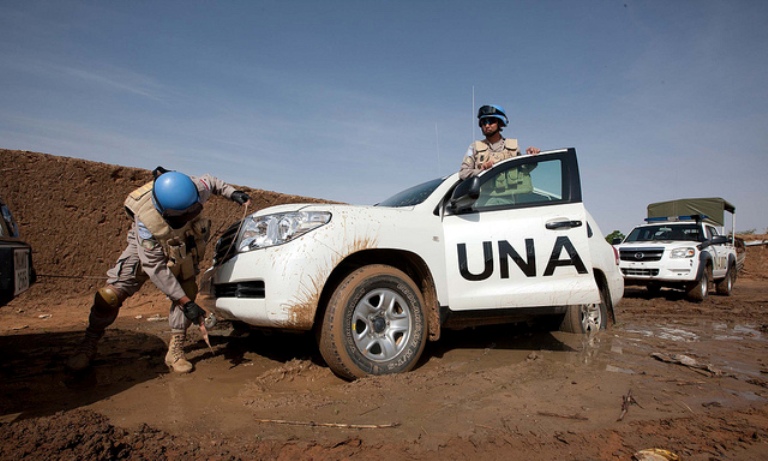UN formally proposes to readjust UNAMID mandate and drawdown troops

June 14, 20147 (NEW YORK) – United Nations secretary general Wednesday has officially proposed to change the mandate of African Union-United Nations Hybrid Operation in Darfur (UNAMID) and to reduce by a half its troops.
The proposal was made by the Assistant Secretary-General for UN peacekeeping operations, El Ghassim Wane in a briefing before the Security Council on the recommendations of the Special Report of the Chairperson of the African Union Commission and the Secretary-General on the strategic review of UNAMID.
The Mauritanian diplomat told the 15-member body that the level of armed hostilities significantly lower than in previous years, pointing that the hybrid operation should readjust its mandate and reduce the number of peacekeepers deployed in Darfur, except Jebel Marra where rebel pockets are still present.
Further, he underlined that despite the government successful efforts to reduce the rebellion, there are still over 2.7 million displaced persons, attacks by gunmen, and intercommunal (tribal) disputes over land and other resources.
Accordingly, the report recommended a two-pronged approach, he said, explaining that it would combine peacebuilding in most parts of Darfur with traditional peacekeeping tasks in Jebel Marra and the vicinity. In this manner, the hybrid mission can address the insecurity and make possible the return of internally displaced persons.
“Such a concept would entail the closure of 11 team sites, the opening of a temporary operating base in the Jebel Marra town of Golo and military withdrawal from another 7 team sites out of the current total of 36, he continued. That, in turn, would enable UNAMID to reduce its troop ceiling to 8 battalions, or 8,735 troops, from the current 16 battalions, and its police ceiling to 2,360”.
The UN peacekeeping official further explained that the UNAMID mandate and priorities would be the protection of civilians in Jebel Marra, dealing with the tribal conflicts and the implementation of the Doha Document for Peace in Darfur (DDPD).
The Security Council is expected to endorse these changes next 18 June, as they have the support of permanent members including the American administration which is supportive to Sudanese government efforts to open humanitarian access to the civilians in the conflict-affected areas and to abide by a unilateral cessation of hostilities.
Also, the African Union and the United Nations officials say the armed groups refuse to make the needed efforts for a lasting peace. The recent rebel attacks in North and East Darfur states despite the declared truce further angered them and already the African Union Peace and Security Council condemned it.
However, Gibril Ibrahim the leader of Justice and Equality Movement (JEM) and Minni Minnawi leader of a Sudan Liberation Movement faction (SLM-MM) addressed a joint letter to the UN Security Council called to extend the UNAMID (current mandate for another year without change, and “by further enhancing its mandate to support peace and security for the people of Darfur”.
The two rebel leaders pointed in their letter seen by Sudan Tribune to the human rights and humanitarian violations that ICC Prosecutor Fatou Bensouda had mentioned in its report to the Council earlier this month.
They further said the reduction of military clashes in the region does not means the end of the conflict “or that violent conflict will not escalate again”. In addition they called to support the ongoing efforts “to fully addressing the root causes and consequences of the conflict is key to a durable peace in Darfur”.
For his part, Sudanese Ambassador at the United Nations Omer Dahab Fadl Mohamed welcomed the unprecedented resolution and expressed Sudan readiness to cooperate fully to ensure a smooth, phased and complete UNAMID exit that would set an example for other missions.
He also called to reconsider the UN targeted sanctions and arms embargo imposed by the Security Council in line with the resolution 1591 (2005).
Concerning the IDPs, the Sudanese diplomat said his government has a plan ” entailing three options: voluntary return to their places of origin; the integration of camps into nearby cities; and enabling internally displaced persons to choose where they wished to be relocated.” He further called to support is implementation and provide the needed financial assistance.
Also, he urged the UN officials to be more accurate when it comes to counting the number of the IDPs in Darfur. He said the actual number was 1.8 million, compared to UNAMID’s figure of 2.7 million. As for humanitarian access, he said 92 per cent of Darfur could be reached without authorization.
(ST)
